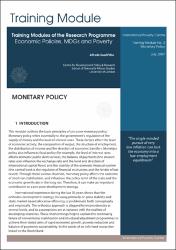Please use this identifier to cite or link to this item:
https://repositorio.ipea.gov.br/handle/11058/15508Files in This Item:
| File | Description | Size | Format | |
|---|---|---|---|---|
| en_IPCTrainingModule2.pdf | 460.48 kB | Adobe PDF |  View/Open |
| Title: | Monetary Policy |
| Authors: | Filho, Alfredo Saad |
| Abstract: | This m odule outlines the basic principles ofpro-poor m onetary policy. Monetary policy refers essentially to the government’s regulation of the supply of money and the level of interest rates. These factors affect the level of economic activity, the com position of output, the structure of employment, the distribution of income and the direction of economic transfers. Monetary policy also influences fiscal policy (for example, the level of interest rates affects domestic public debt service), the balance of payments (the interest rates also influence the exchange rate and the level and direction of international capital flows) and the stability of the domestic financial system (the central bank is the regulator of financial institutions and the lender of last resort). Through these various channels, monetary policy affects the outcome of short-run stabilisation, and influences the policy remit of the state and the economic growth rate in the long run. Therefore, it can make an important contribution to a pro-poor development strategy. (...) |
| metadata.dc.rights.holder: | International Policy Centre for Inclusive Growth United Nations Development Programme |
| metadata.dc.rights.license: | O texto e dados desta publicação podem ser reproduzidos desde que as fontes sejam citadas. Reproduções com fins comerciais são proibidas. |
| metadata.dc.type: | Training Module |
| Appears in Collections: | Publicações do IPC-IG |
Items in DSpace are protected by copyright, with all rights reserved, unless otherwise indicated.

